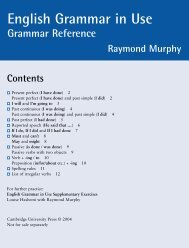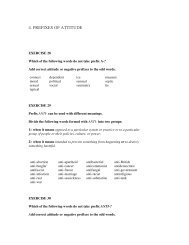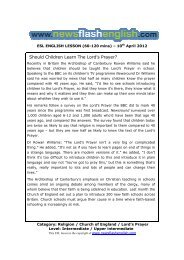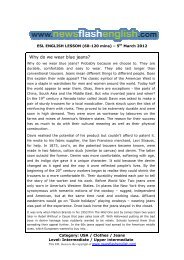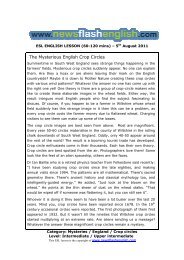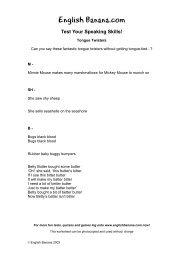A Grammar of the English Tongue - ESL Teachers Board
A Grammar of the English Tongue - ESL Teachers Board
A Grammar of the English Tongue - ESL Teachers Board
Create successful ePaper yourself
Turn your PDF publications into a flip-book with our unique Google optimized e-Paper software.
A <strong>Grammar</strong> <strong>of</strong> <strong>the</strong> <strong>English</strong> <strong>Tongue</strong> 23Scholar, Gen. Scholar's. Plur. Scholars.These genitives are always written with a mark <strong>of</strong> elision, master's,scholar's, according to an opinion long received, that <strong>the</strong> 's is a contraction<strong>of</strong> his, as <strong>the</strong> soldier's valour, for <strong>the</strong> soldier his valour: but this cannot be<strong>the</strong> true original, because 's is put to female nouns, Woman's beauty; <strong>the</strong>Virgin's delicacy; Haughty Juno's unrelenting hate; and collective nouns, asWomen's passions; <strong>the</strong> rabble's insolence; <strong>the</strong> multitude's folly: in all <strong>the</strong>secases it is apparent that his cannot be understood. We say likewise <strong>the</strong>foundation's strength; <strong>the</strong> diamond's lustre; <strong>the</strong> winter's severity: but in<strong>the</strong>se cases his may be understood, he and his having formerly been appliedto neuters in <strong>the</strong> place now supplied by it and its.The learned and sagacious Wallis, to whom every <strong>English</strong> grammarianowes a tribute <strong>of</strong> reverence, calls this modification <strong>of</strong> <strong>the</strong> noun an adjectivepossessive; I think with no more propriety than he might have applied <strong>the</strong>same to <strong>the</strong> genitive in equitum decus, Trojæ oris, or any o<strong>the</strong>r Latingenitive. Dr. Lowth, on <strong>the</strong> o<strong>the</strong>r part, supposes <strong>the</strong> possessive pronounsmine and thine to be genitive cases.This termination <strong>of</strong> <strong>the</strong> noun seems to constitute a real genitive indicatingpossession. It is derived to us from <strong>the</strong> Saxon's who declined smith, asmith; Gen. smi<strong>the</strong>r, <strong>of</strong> a smith; Plur. smi<strong>the</strong>r or smithar, smiths; and so intwo o<strong>the</strong>r <strong>of</strong> <strong>the</strong>ir seven declensions.It is a fur<strong>the</strong>r confirmation <strong>of</strong> this opinion, that in <strong>the</strong> old poets both <strong>the</strong>genitive and plural were longer by a syllable than <strong>the</strong> original word: knitisfor knight's, in Chaucer; leavis for leaves, in Spenser.When a word ends in s, <strong>the</strong> genitive may be <strong>the</strong> same with <strong>the</strong> nominative,as Venus temple.The plural is formed by adding s, as table, tables; fly, flies; sister, sisters;wood, woods; or es where s could not o<strong>the</strong>rwise be sounded, as after ch, s,sh, x, z; after c sounded like s, and g like j; <strong>the</strong> mute e is vocal before s, aslance, lances; outrage, outrages.




